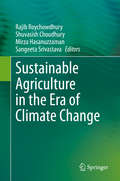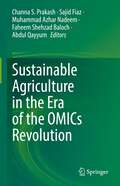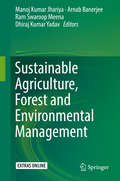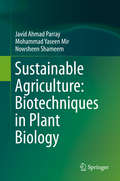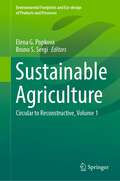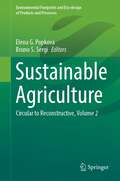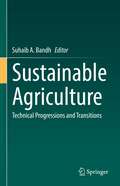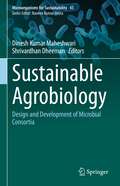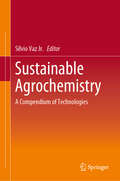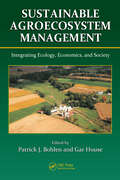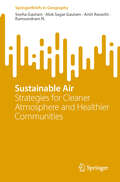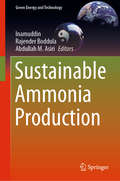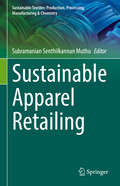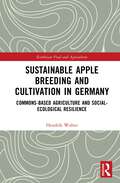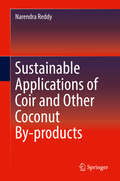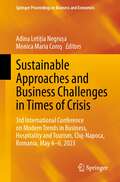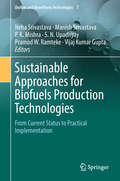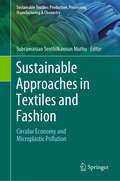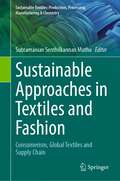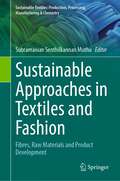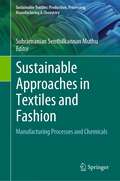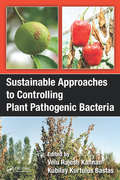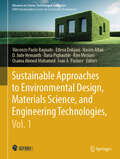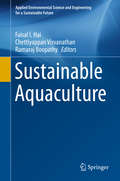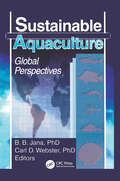- Table View
- List View
Sustainable Agriculture in the Era of Climate Change
by Sangeeta Srivastava Mirza Hasanuzzaman Rajib Roychowdhury Shuvasish ChoudhuryUnder ongoing climate changes, natural and cultivated habitats of major crops are being continuously disturbed. Such conditions impose and exacerbate abiotic and biotic stressors. Drought, salinity, flood, cold, heat, heavy metals, metalloids, oxidants, irradiation, etc. are important abiotic stressors, while diseases and infections caused by plant pathogens, such as fungal agents, bacteria and viruses, are major biotic stresses. In many instances, stresses have become the major limiting factor for agricultural productivity and exert detrimental role on growth and yield of the crops. To help feed an ever increasing world population and to ensure global food security, concerted efforts from scientists and researchers have identified strategies to manage and mitigate the impacts of climate-induced stresses. This book, summarizing their findings, is aimed at crop improvement beyond such kind of barriers, by agronomic practices (genetics, breeding, phenotyping, etc.) and biotechnological applications, including molecular markers, QTL mapping, genetic engineering, transgenesis, tissue culture, various 'omics' technologies and gene editing. It will cover a wide range of topics under environmental challenges, agronomy and agriculture processes, and biotechnological approaches. Additionally, fundamental mechanisms and applied information on stress responses and tolerance will be discussed. This book highlights problems and offers proper solutions for crop stress management with recent information and up-to-date citations. We believe this book is suitable for scientists, researchers and students working in the fields of agriculture, plant science, environmental biology and biotechnology.
Sustainable Agriculture in the Era of the OMICs Revolution
by Abdul Qayyum Channa S. Prakash Sajid Fiaz Faheem Shehzad Baloch Muhammad Azhar NadeemAccess to food with enough calories and nutrients is a fundamental right of every human. The global population has exceeded 7.8 billion and is expected to pass 10 billion by 2055. Such rapid population increase presents a great challenge for food supply. More grain production is needed to provide basic calories for humans. Thus, it is crucial to produce 60-110% more food to fill the gap between food production and the demand of future generations.Meanwhile food nutritional values are of increasing interest to accommodate industrialized modern lives. The instability of food production caused by global climate change presents another great challenge. The global warming rate has become more rapid in recent decades, with more frequent extreme climate change including higher temperatures, drought, and floods. Our world faces various unprecedented scenarios such as rising temperatures, which causes melting glaciers and the resulting various biotic and abiotic stresses, ultimately leading to food scarcity. In these circumstances it is of utmost importance to examine the genetic basis and extensive utilization of germplasm to develop “climate resilient cultivars” through the application of plant breeding and biotechnological tools. Future crops must adapt to these new and unpredictable environments. Crop varieties resistant to biotic and abiotic stresses are also needed as plant disease, insects, drought, high- and low-temperature stresses are expected to be impacted by climate change. Thus, we need a food production system that can simultaneously satisfy societal demands and long-term development.Since the Green Revolution in the 1960s, farming has been heavily dependent on high input of nitrogen and pesticides. This leads to environmental pollution which is not sustainable in the long run. Therefore, a new breeding scheme is urgently needed to enable sustainable agriculture; including new strategies to develop varieties and crops that have high yield potential, high yield stability, and superior grain quality and nutrition while also using less consumption of water, fertilizer, and chemicals in light of environmental protection. While we face these challenges, we also have great opportunities, especially with flourishing developments in omics technologies. High-quality reference genomes are becoming available for a larger number of species, with some species having more than one reference genome. The genome-wide re-sequencing of diverse varieties enables the identification of core- and pan-genomes. An integration of omics data will enable a rapid and high-throughput identification of many genes simultaneously for a relevant trait. This will change our current research paradigm fundamentally from single gene analysis to pathway or network analysis. This will also expand our understanding of crop domestication and improvement. In addition, with the knowledge gained from omics data, in combination with new technologies like targeted gene editing, we can breed new varieties and crops for sustainable agriculture.
Sustainable Agriculture, Forest and Environmental Management
by Ram Swaroop Meena Manoj Kumar Jhariya Arnab Banerjee Dhiraj Kumar YadavThe recent technologies for sustainable development and maintaining ecological integrity in the field of agriculture, forestry and environmental management for the green future. Describes the recent technologies and issues to generate awareness among the global scientific community towards sustainable development.Covers various eco-friendly approaches for successful management of soil, water, forest, agriculture, and other natural resources. Addresses the policy issues promoting conservation, protection and management of various natural resources. Presents the issues of climate change and sustainable strategies to combat such a mega event. The existence of life on the earth primarily depends upon the agriculture, forest and environment. The changing climate is imposing the multifaceted challenges in front of human civilization. The agroecosystem management practices and technologies leads to higher productivity with destruction of agricultural, forest and environmental habitat leading to soil-water-air pollution. Food and Agriculture Organization (FAO) plays a key role in the promoting research and developmental activities in various sectors to achieve the sustainable development goals under 2030 agenda. Gradual growth of science and technology has imposed a significant pressure on the different ecosystem. In this context, approaches such as sustainable agriculture, forestry and eco-friendly technologies need to be address across the world. Keeping view of these facts this book underlines scientific chapters dealing with the issues with proper explanation, and accompanied by illustrative diagrams, tables, database as required. The editors have tried to provide a brief scenario about the current issues related to the agriculture, forestry and environment. Therefore, the book would be a very useful resource for academicians, scientists, and policy makers of the related field.
Sustainable Agriculture: Biotechniques in Plant Biology
by Javid Ahmad Parray Nowsheen Shameem Mohammad Yaseen MirThis book will be of immense helpful to the students of plant biotechnology, Agricultural sciences, Microbiology of both undergraduate and postgraduate levels in universities, colleges, and Research institutes. Besides the book will be quite supportive researchers who work in the field of plant biotechnology and agricultural sciences. In this book, the main focus will be on advanced genome editing approaches for the production of GM crops besides their socioeconomic, ethical and risk-biosafety assessments. Nanotechnology is the new emerging and fascinating field of science finds its application in almost all the major research areas and its uses in agriculture and food sectors are incipient.The books seems to be first in summarizing the two way interactive approach in the field of plant biotechnology and setting of a new arena in shaping the new bio techniques towards the sustainable cause.
Sustainable Agriculture: Circular to Reconstructive, Volume 1 (Environmental Footprints and Eco-design of Products and Processes)
by Elena G. Popkova Bruno S. SergiThis book highlights the environmental footprints and best practices in sustainable agriculture. This first volume includes forty-four interesting chapters that present agriculture in the light of food security, circular economy, sustainability, food exports and imports written by leading experts in the field. It provides and interesting read for researchers, policy makers and professionals in the area of agriculture and economy.
Sustainable Agriculture: Circular to Reconstructive, Volume 2 (Environmental Footprints and Eco-design of Products and Processes)
by Elena G. Popkova Bruno S. SergiThis book highlights the environmental footprints and best practices in sustainable agriculture. This second volume includes fifteen interesting chapters that present agriculture in the light of forest conservation, circular economy, climate change, sustainability, food security during pandemics and soil conservation, written by leading experts in the field. It provides and interesting read for researchers, policy makers and professionals in the area of agriculture and economy.
Sustainable Agriculture: Technical Progressions and Transitions
by Suhaib A. BandhThis book discusses a number of recent technological and methodological progressions in achieving sustainable agriculture. It covers innovative and economically viable techniques for growers, laborers, consumers, policymakers, and others working to develop food-secure and ecologically sound agricultural practices to benefit humans and the environment. The key topics addressed include the increasing role of biofertilizers in sustainable agriculture, green synthesized nanoparticles for higher crop production rates, eco-friendly plant-based pesticides as alternatives to synthetic/chemical pesticides, use of genomics for improved plant breeding practices, and the use of biochar to increase the water-holding capacity in soil. The book concludes with an overview of satellite-based soil erosion practices to monitor and control the harmful impacts of land degradation, and a discussion of long-term strategies to reduce crop losses due to pest and insecticide damage. The book will be of interest to students and researchers in the field of environmental science, agriculture science, agronomy, and sustainable development.
Sustainable Agrobiology: Design and Development of Microbial Consortia (Microorganisms for Sustainability #43)
by Dinesh Kumar Maheshwari Shrivardhan DheemanThis edited volume covers all aspects of microbes in consortia; their roles in the ecological balance of soil by mineralize soil nutrients, plant growth promotion, protecting plants from disease by acting as biocontrol agents etc. Step-by-step descriptions are provided to the development and designing strategies of microbial consortia of rhizobacteria, phytohormone producing with biocontrol; ACC-deaminase producing with siderophore producing; vice-versa, and many combinations of multifaceted bacteria. The development of microbial consortia into successful bioinoculant and biofertilizers is also included in various chapters. In addition, molecular mechanisms to study the synergistic behaviors of rhizobacteria, accompanied by numerous helpful schematic drawings. Using phylogeny to justify the molecular similarity among two different bacteria identifies the possibility of microbial synergism, fruitful to development of microbial consortium and establish them in the rhizosphere with consorted mechanisms. In addition, clear drawings are included in support of understanding the natural phenomenon of synergism in below-ground ecosystem. Essential information is provided on ecological management by consorted mechanisms of rhizobacteria that directly affect ‘agriculture sustainability’ and an individual chapter is devoted to the understanding of future research, and addressing bottlenecks and successful steps. This book assists the academicians, researchers and NGOs in negotiating the steep learning curve involved in gaining the skills needed to perform design and development of microbial consortiums, preparation of PGPR-based fertilizers, which offers significant advantages in terms of pertaining novel knowledge on the groundbreaking research, still ongoing.
Sustainable Agrochemistry: A Compendium of Technologies
by Sílvio Vaz Jr.This book presents a broad range of technologies for sustainable agrochemistry, e.g. semiochemicals for pest management, nanotechnology for release of eco-friendly agrochemicals, and green chemistry principles for agriculture. It provides a concise introduction to sustainable agrochemistry for a professional audience, and highlights the main scientific and technological approaches that can be applied to modern agrochemistry. It also discusses various available technologies for reducing the negative impacts of agrochemicals on the environment and human health.
Sustainable Agroecosystem Management: Integrating Ecology, Economics, and Society
by Patrick J. Bohlen Gar HouseSustainable Agroecosystem Management: Integrating Ecology, Economics, and Society examines the challenges for developing integrated approaches to the management of agricultural ecosystems. Providing historical background of attempts to bridge the ecological and agricultural sciences, this book highlights recent efforts to integrate natural and social science perspectives. Through various case studies with global applications, the text explores practical innovative strategies, policies, and research needs for emphasizing whole system productivity, diversification of agricultural operations, and management of agricultural systems that sustain multiple functions including ecological integrity.
Sustainable Air: Strategies for Cleaner Atmosphere and Healthier Communities (SpringerBriefs in Geography)
by Amit Awasthi Sneha Gautam Alok Sagar Gautam Ramsundram N.This volume explores the critical intersection of environmental sustainability and public health by exploring innovative approaches to address air pollution. With the ever-increasing global population and urbanization, air quality degradation has become a pressing concern, directly impacting the well-being of individuals and the planet. This comprehensive work synthesizes the latest research findings, policy insights, and technological advancements to offer a holistic perspective on mitigating air pollution while fostering sustainable development. The book begins by establishing a firm understanding of the multifaceted nature of air pollution, from its sources and composition to its effects on human health and the environment. Drawing on interdisciplinary research, it examines the intricate links between air quality, climate change, and societal well-being. "Sustainable Air" then shifts its focus to practical strategies and solutions, presenting a range of innovative approaches for reducing emissions, promoting clean energy sources, and enhancing urban planning to create livable, resilient communities. Through case studies and real-world examples, the book highlights successful initiatives from around the world, demonstrating how communities can transition to cleaner and more sustainable air quality standards. It also addresses the critical role of policy frameworks and international cooperation in achieving long-term air quality goals. Moreover, the book underscores the importance of public awareness and engagement, emphasizing the power of informed citizenry in advocating for cleaner skies and healthier environments. "Sustainable Air: Strategies for Cleaner Skies and Healthier Communities" provides a roadmap for policymakers, urban planners, researchers, and concerned citizens to collaboratively work towards a future where clean air and sustainable living are not only attainable but also synonymous with human progress. By promoting a balanced and harmonious relationship between society and the environment, this book aspires to inspire meaningful change, ultimately leading to improved air quality and well-being for generations to come.
Sustainable Ammonia Production (Green Energy and Technology)
by Inamuddin Abdullah M. Asiri Rajender BoddulaThis book presents sustainable synthetic pathways and modern applications of ammonia. It focuses on the production of ammonia using various catalytic systems and its use in fuel cells, membrane, agriculture, and renewable energy sectors. The book highlights the history, investigation, and development of sustainable pathways for ammonia production, current challenges, and state-of-the-art reviews. While discussing industrial applications, it fills the gap between laboratory research and viable applications in large-scale production.
Sustainable Apparel Retailing (Sustainable Textiles: Production, Processing, Manufacturing & Chemistry)
by Subramanian Senthilkannan MuthuThis book offers a variety of cases that detail consumer behavior in the apparel industry as well as sustainable retail practices. The studies offer in-depth examination of sustainable practices within the apparel industry, covering topics such as sourcing sustainable materials, transparency in the supply chain, and innovative manufacturing processes. It also addresses the challenges and opportunities retailers face in balancing sustainability with fashion trends, ensuring compliance with environmental and labor standards, and leveraging new technologies and consumer preferences to drive growth and sustainability.
Sustainable Apple Breeding and Cultivation in Germany: Commons-Based Agriculture and Social-Ecological Resilience (Earthscan Food and Agriculture)
by Hendrik WolterApplying a socio-ecological framework, this book explores how the innovative approach of commons-based organic apple breeding can contribute to sustainability in agricultural and food systems more widely. As fruit breeding and cultivation systems are confronted with a range of sustainability challenges, there are calls for new and innovative breeding approaches beyond mainstream economic solutions that would mitigate these sustainability challenges. Apples, in particular, are facing serious environmental challenges, with the negative environmental impacts of modern conventional breeding and farming, loss of agrobiodiversity, low participation and diminishing diversity of market actors in the wake of privatization and economization trends result in a lack of resilience in current breeding and cultivation systems. Drawing on in-depth case study research on apple production in Germany, this book advances the innovative solution of commons-based apple breeding as a model for developing resilience in fruit breeding and cultivation. It analyzes this approach, comparing it with more conventional practices, and showcases which factors could inhibit the broad implementation of commons-based apple breeding and how they can be overcome to exploit its full potential. Contributing to the great ambition of finding sustainable solutions across all agricultural sectors, this book opens up new and interdisciplinary perspectives on fruit breeding and cultivation, which is a largely neglected issue in contemporary discussions on agriculture and food production. This book will be of great interest for students and scholars from the fields of sustainable food systems, sustainable agriculture, crop science, and resource management and in particular those that seek inspiration for innovative approaches rooted in sustainability research, social-ecological resilience, and the commons.
Sustainable Applications of Coir and Other Coconut By-products
by Narendra ReddyThis book provides detailed information on the methods and techniques that can be used to process coir, cocopeat and other coconut byproducts for developing various bioproducts. Coir is a unique raw material in that it is abundant, green, and sustainable. The most common industrial application of coir is to use it as a reinforcement of composites with other natural or synthetic fibers and resins. Coir-based composites are used in automotive, construction, and packaging, among other applications. Recently cocopeat, coconut shells and other byproducts have been used for energy, environmental remediation and agricultural applications. This is the first reference describing the properties, processability, and applications of all the coconut byproducts. Properties of the products developed are also covered with a major focus on industrial applications.Provides a single, comprehensive reference source on the biorenewable material coir and other coconut byproductsAddresses properties, processing and a broad range of industrial applicationsEnables researchers spanning the materials, polymer, agricultural, composites and environmental areas to identify unique and useful applications of coir and other coconut byproducts
Sustainable Approaches and Business Challenges in Times of Crisis: 3rd International Conference on Modern Trends in Business, Hospitality and Tourism, Cluj-Napoca, Romania, May 4-6, 2023 (Springer Proceedings in Business and Economics)
by Adina Letiția Negrușa Monica Maria CoroşThis book discusses current trends, challenges, and opportunities in the fields of business, hospitality, and tourism, particularly in Eastern Europe. Featuring selected papers presented at the second annual Modern Trends in Business Hospitality and Tourism International Conference held in Cluj-Napoca, Romania in 2023, the enclosed chapters explore the global marketing environment discussing the latest technological, economic and social-cultural developments. Featuring theoretical and empirical research and real-life case studies, this book explores topics such as global capital markets and investment financing post COVID-19, sustainable business models, financing alternatives for SMEs, corporate governance, human capital leadership, among others. It is appropriate for academics, researchers, scholars and practitioners in the areas of business, hospitality and tourism.
Sustainable Approaches for Biofuels Production Technologies: From Current Status to Practical Implementation (Biofuel and Biorefinery Technologies #7)
by P. K. Mishra Neha Srivastava Manish Srivastava Pramod W. Ramteke S. N. Upadhyay Vijaj Kumar GuptaThis volume focuses on technological advances relevant to establishing biofuels as a viable alternative to fossil fuels by overcoming current limitations. The progressive depletion of fossil fuels due to their large-scale utilization and their environmental consequences, notably global warming, increase the need for sustainable and cleaner energy options. Renewable biofuels – like biohydrogen, biomethane, biogas, ethanol and butenol – represent attractive energy sources to meet the growing global demand, thanks to sustainable and cost-efficient production approaches based on cellulosic biomass. Currently, the commercialization of these technologies is hindered by technical and economic limitations, such as biomass complexity and pre-treatment, enzyme hydrolysis, production efficiency as well as storage and cost. As such, this book presents economically viable and sustainable approaches to improve existing biofuel technologies and appeals to anyone with an interest in biofuels as renewable energy options and their practical implementation.
Sustainable Approaches in Textiles and Fashion: Circular Economy and Microplastic Pollution (Sustainable Textiles: Production, Processing, Manufacturing & Chemistry)
by Subramanian Senthilkannan MuthuThis first of this set of books presents the various sustainable approaches in terms of circular economy and micro plastic pollution pertaining to the textiles and fashion supply chain. Sustainability is one of the important aspects in today’s industrial context, which is followed by every industrial sector with no exception to textiles and fashion. Sustainability and strict adherence to the principles of sustainability has become one of the essential needs in industry. There are countless measures in terms of various approaches to make the textiles and fashion sector sustainable. These measures, but not limited to, range from innovating and implementing new fibres and raw materials, introducing innovative manufacturing methods, chemicals, processes to focus on all the possible stages of a textile product’s life cycle from cradle to grave. These approaches include making the textiles and fashion sector circular and also development of new products from sustainable raw materials/processes or combination of both.
Sustainable Approaches in Textiles and Fashion: Consumerism, Global Textiles and Supply Chain (Sustainable Textiles: Production, Processing, Manufacturing & Chemistry)
by Subramanian Senthilkannan MuthuThis second volume in this set of books discusses various sustainable approaches in textiles and the fashion sector with a focus on consumerism and the supply chain. Sustainability is one of the important aspects in today’s industrial context, and is no exception to textiles and fashion. Sustainability and strict adherence to the principles of sustainability has become as one of the essential needs again for any industrial sector including textiles and fashion. There are countless measures in terms of various approaches to make the textiles and fashion sector sustainable. These measures, but not limited to, ranging from innovating and implementing new fibres and raw materials, introducing innovative manufacturing methods, chemicals, processes to focus on all the possible stages of a textile product’s life cycle from cradle to grave. These approaches include making the textiles and fashion sector circular and also development of new products from sustainable raw materials/processes or combination of both.
Sustainable Approaches in Textiles and Fashion: Fibres, Raw Materials and Product Development (Sustainable Textiles: Production, Processing, Manufacturing & Chemistry)
by Subramanian Senthilkannan MuthuThis third volume in the set of books is dedicated to various sustainable approaches in textiles and fashion sector with a focus on fibres and raw materials employed. Sustainability is one of the important aspects in today’s industrial context, which is followed by every industrial sector with no exception to textiles and fashion. Sustainability and strict adherence to the principles of sustainability has become as one of the essential needs again for any industrial sector including textiles and fashion. There are countless measures in terms of various approaches to make the textiles and fashion sector sustainable. These measures, but not limited to, ranging from innovating and implementing new fibres and raw materials, introducing innovative manufacturing methods, chemicals, processes to focus on all the possible stages of a textile product’s life cycle from cradle to grave. These approaches include making the textiles and fashion sector circular and also development of new products from sustainable raw materials/processes or combination of both.
Sustainable Approaches in Textiles and Fashion: Manufacturing Processes and Chemicals (Sustainable Textiles: Production, Processing, Manufacturing & Chemistry)
by Subramanian Senthilkannan MuthuThis fourth volume in the series presents various sustainable approaches in the textile and fashion sector with a focus on manufacturing processes and chemicals. Sustainability is one of the important aspects in today’s industrial context, which is followed by every industrial sector with no exception to textiles and fashion. Sustainability and strict adherence to the principles of sustainability has become as one of the essential needs again for any industrial sector including textiles and fashion. There are countless measures in terms of various approaches to make the textiles and fashion sector sustainable. These measures, but not limited to, ranging from innovating and implementing new fibres and raw materials, introducing innovative manufacturing methods, chemicals, processes to focus on all the possible stages of a textile product’s life cycle from cradle to grave. These approaches include making the textiles and fashion sector circular and also development of new products from sustainable raw materials/processes or combination of both.
Sustainable Approaches to Controlling Plant Pathogenic Bacteria
by V. Rajesh Kannan Kubilay Kurtulus BastasPlant diseases and changes in existing pathogens remain a constant threat to our forests, food, and fiber crops as well as landscape plants. However, many economically important pathosystems are largely unexplored and biologically relevant life stages of familiar systems remain poorly understood. In a multifaceted approach to plant pathogenic behav
Sustainable Approaches to Environmental Design, Materials Science, and Engineering Technologies, Vol. 1 (Advances in Science, Technology & Innovation)
by Ivan A. Parinov D. Jude Hemanth Hasim Altan Ilaria Pigliautile Etleva Dobjani Vincenzo Paolo Bagnato Rim Meziani Osama Ahmed MohamedThis book highlights the sustainable innovation in environmental design, materials science, and engineering technologies. It provides a multidisciplinary approach to addressing contemporary challenges in creating resilient, efficient, and health-promoting built environments. With contributions from leading experts, the book covers a wide range of topics including architectural design, urban planning, sustainable materials, and renewable energy technologies. Also, it explores sustainable solutions and innovative practices across a range of disciplines essential for the future of our built environment. It examines architectural design, urban planning, and infrastructure, highlighting approaches that promote resilience and efficiency in urban settings. The book aligns with sustainable development goals, providing practical insights and strategies to achieve global sustainability targets. This book focuses on sustainable methodologies in material sciences, exploring the latest advancements in eco-friendly materials and their applications in construction. The integration of renewable energy technologies is thoroughly examined, showcasing how these innovations can reduce environmental impacts and enhance energy efficiency. Additionally, the book addresses the crucial theme of environmental integration and impacts, presenting comprehensive studies on the intersection of engineering technologies with environmental sustainability. Furthermore, it is an indispensable resource for professionals, researchers, and students dedicated to fostering sustainable development across multiple fields. It offers valuable guidance on implementing sustainable practices to create a healthier and more sustainable world.
Sustainable Aquaculture (Applied Environmental Science And Engineering For A Sustainable Future Ser.)
by Faisal I. Hai Chettiyappan Visvanathan Ramaraj BoopathyThis book is about important relevant recent research topics in sustainable aquaculture practices. A critical assessment of the sustainable fishing methods and the aspect of sustainable aquaculture feed is presented in this volume. A special focus has been given to socio-economic and environmental assessment of aquaculture practices and analysis of carbon footprint under an intensive aquaculture regime. Aquaponics as a niche for sustainable modern aquaculture has been highlighted. The effect of use of pharmaceuticals to prevent fish disease on the surrounding marine environment is an emerging area of concern, and a critical discussion on this aspect is included in the book. The spread of organic waste and nutrients released by fish farms to natural water bodies has raised considerable concerns. Therefore the methods to prevent their dispersion and removal (treatment) have been comprehensively covered in this book. This book is an essential read for academician, researchers, and policy makers in the field of aquaculture.
Sustainable Aquaculture: Global Perspectives
by Carl D Webster Bana B. JanaExamine the world's leading aquaculture producers! Sustainable Aquaculture: Global Perspectives is a one-of-a-kind primer on the world's leading sources of aquatic production, presenting expert commentary that includes the latest advancements, developments, and research findings. The book examines essential elements of aquaculture (water quality, nutrition, genetics, culture methods) and addresses problems such as over-fishing, coastal and wetland destruction, and habitat and environmental degradation. Sustainable Aquaculture: Global Perspectives addresses policy measures that are essential for the long-term sustainability of the world's fisheriesand the long-term employment of those who rely on the aquaculture industry for their livelihood. As the world's population increases at an alarming rate, the question of how to ensure global food security is one of extreme importance. But the world's total yield is below expectations and the book examines the reasons why: the under-utilization of natural resources, the lack of adoption of modern scientific methods, the lack of standardized, proven pond fertilization protocols; long-term inbreeding and the loss of genetic variability due to genetic drift. Sustainable Aquaculture: Global Perspectives also addresses: freshwater pearl culture breeding programs pond fertilization regimes fish diseases in tropical climates indoor recirculating culture systems water quality management for shrimp farming and much more! With much of its information available in one place for the first time, Sustainable Aquaculture: Global Perspectives is invaluable as a textbook for introductory aquaculture courses and is an essential resource for professionals and researchers.
